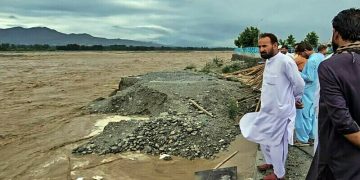Politics will likely consume much of Pakistan’s time and attention in 2023, as it did in 2022. The country’s turn to political instability last spring did not end with a dramatic no-confidence vote in parliament last April, 2022 that ousted then Pakistani Prime Minister Imran Khan from office.
Instability and polarization have only heightened since then: Khan has led a popular opposition movement against the incumbent coalition government and the military, staging a series of large rallies across the country through the year. The struggle for power in Pakistan continues into 2023. While the incumbent government has not ceded to Khan’s demand for early elections, country-wide elections are constitutionally mandated to be held by October this year. It benefits the government politically to hold them off as long as it possibly can as it tries to dig itself out of Pakistan’s urgent economic crisis and its lackluster domestic performance (its diplomatic foreign policy approach has fared better, but that may not matter for elections). The last year has cost it precious political capital, and Khan’s party did very well in a set of by-elections held in July and October. The state has tried to mire Khan and his party in legal cases, relying on a familiar playbook used against opposition politicians in Pakistan, albeit to limited effect, with the courts’ involvement.
It has caused severe economic challenges for months due to which food, gas and oil prices have risen. The Russian invasion of Ukraine has caused fuel prices to rise worldwide. Excessive external borrowings by the country over the years raised the specter of default, causing the currency to fall and making imports more expensive in relative terms.
By June 2022, inflation was at an all-time high, along with rising food prices. Poor governance and low productivity per capita in comparison with other low to middle-income developing countries have contributed to a balance of payment crisis, where the country is unable to earn enough foreign exchange to fund the imports that it consumes. This burden has been exacerbated by the derailment of $6.5 billion International Monetary Fund (IMF) program Pakistan entered in 2019, as the international lender is unsatisfied with Pakistan’s commitment to reform and ability to arrange for funds to meet external financing requirements. Pakistan’s official foreign exchange reserves are hovering around $4 billion, which is insufficient to finance even a one-month of the country’s import bill.
Pakistan has doubled its debt roughly every five years over the last 25 year period. Starting from a debt of Rs. 3.06 trillion at the beginning of General Musharraf regime in 1999, debt stood at Rs. 62.5 trillion at the end of the Imran Khan government in 2022. While the debt grew at around 14 percent per year on average, GDP was growing at only 3 percent per year on average. This led to an unsustainable debt burden. In the fiscal year 2022–23, debt servicing obligations of Rs. 5.2 trillion exceed the entire federal government revenue.
Pakistan’s economic crisis was at the center of a political standoff between Prime Minister Shahbaz Sharif and his predecessor Imran Khan in 2022, which led to Khan’s ouster in April 2022. Sharif accused Khan of economic mismanagement and mishandling of the country’s foreign policy, forcing him to step down in a no-confidence vote. Amid ousting, he ignited Haqeeqi Azaadi political movement which caused nationwide political unrest calling for early elections and civilian supremacy which in result worked as a catalyst for already worsening economic condition. During 2019, Imran Khan tried to make a deal with IMF and agreed with the several terms and conditions which resulted the increase in inflation but Imran Khan failed to gain IMF loan.
Pakistan’s paramilitary forces arrested former Prime Minister Imran Khan inside a courthouse in the capital Islamabad on Tuesday. The move has escalated political tensions at a time of economic distress in the country. Khan’s arrest triggered rare pushback against the military, the country’s most powerful institution. According to videos shared by Khan’s media team, the former prime minister’s supporters mostly men, but also some women appeared to overrun a gate leading into the compound of Pakistan’s military headquarters in the city of Rawalpindi. Shouting “Allah Akbar”, or God is great, they are seen in the videos using sticks to smash through the first gate that separates the compound from the road beyond.
It was the first time many Pakistanis could recall such a brazen move against the military. The military did not respond to NPR requests for comment or verify the videos. Khan’s supporters have also shared videos showing men clutching sticks and clubs, smashing up a home they identified as belonging to a senior military official in the Pakistani city of Lahore, and setting it on fire. Supporters held demonstrations outside other military compounds, and appeared to take over a historic military fort in the northwestern city of Peshawar.
In another video, the sound of what appeared to be the crackle of gunfire erupted as protesters dragged away a bleeding, wounded man. NPR has not independently verified the videos. The protests began after footage shared by Khan’s media team showed khaki-clad men breaking a window with their batons to extricate the former prime minister, who was in a room designated to check biometric details. Khan appeared in the Islamabad courthouse on Tuesday to attend a session of one of the dozens of cases he is embroiled in. After being granted bail, Khan has blamed the army chief, General Syed Asim Munir, for the situation in the country. “It’s not the security institution; it is just one man, the army chief. There is no democracy in the army. The army is getting maligned by what is happening right now in the country,” Khan told reporters in the courtroom. “That one man is afraid that when I come to power, I will remove him from his positions, but I will do no such thing”.
Pakistan’s political crisis has worsened an economic crisis that has caused food prices to soar and pushed millions close to starvation. There are concerns that the country could default on its debt, owing to its thin foreign currency reserves. For all of Pakistan’s present instability, the army arresting a prime minister is not unusual in the country’s history. “Ironically, for the instability and unpredictability of the moment”, he says, “there’s a counterfactual to that, which is the predictability of Pakistan: if you are a popular Pakistani politician, you end up in jail”. Being an “Aam Admi”, my question is who is responsible for this destruction in Pakistan?






























